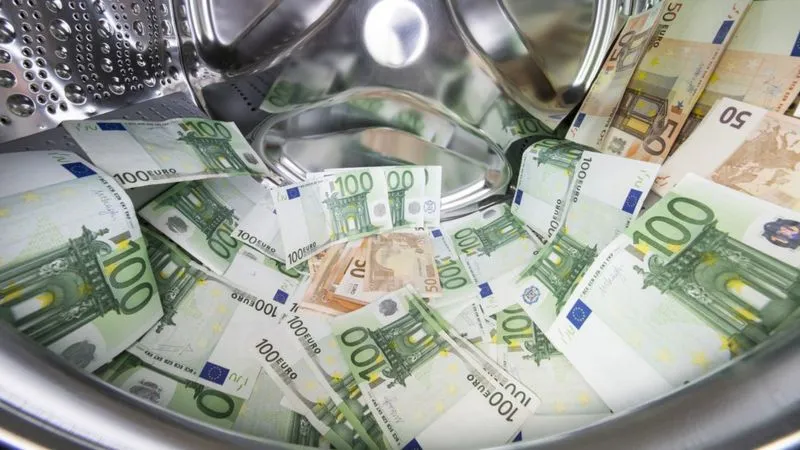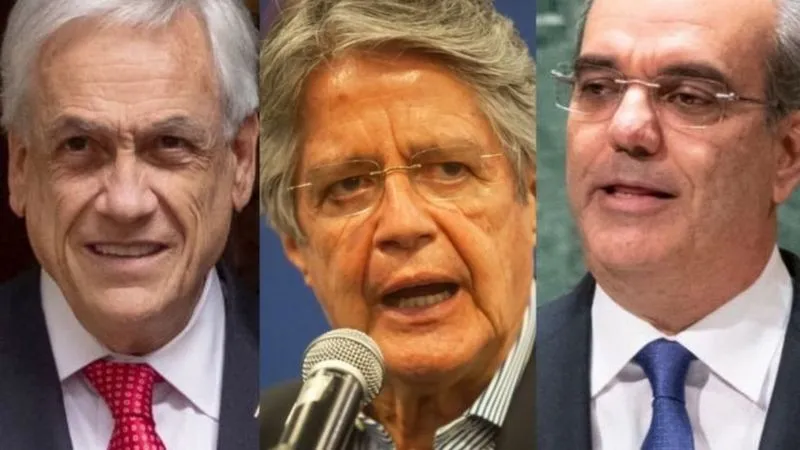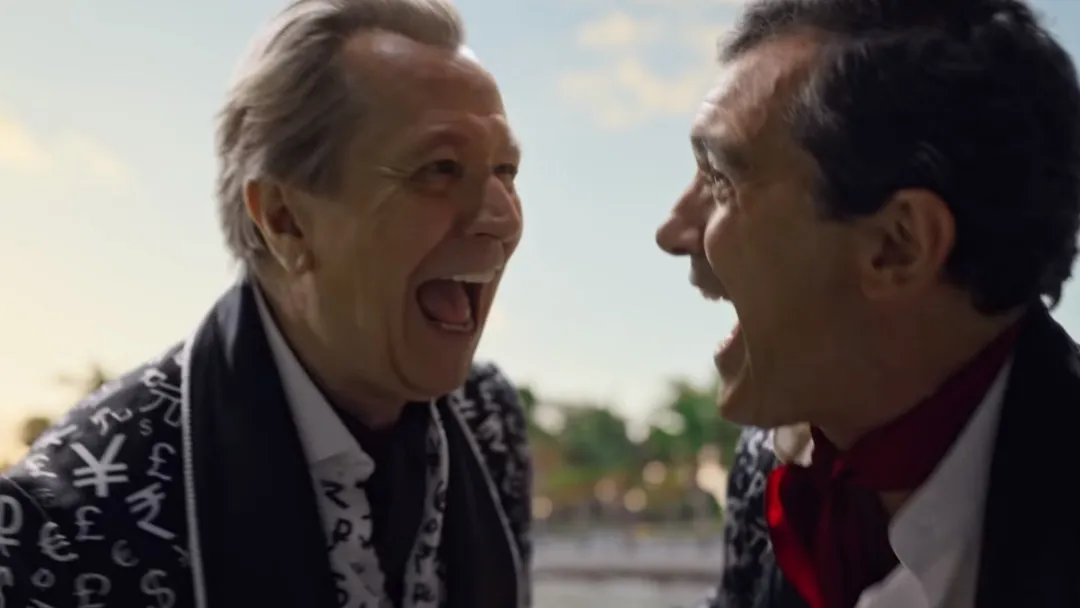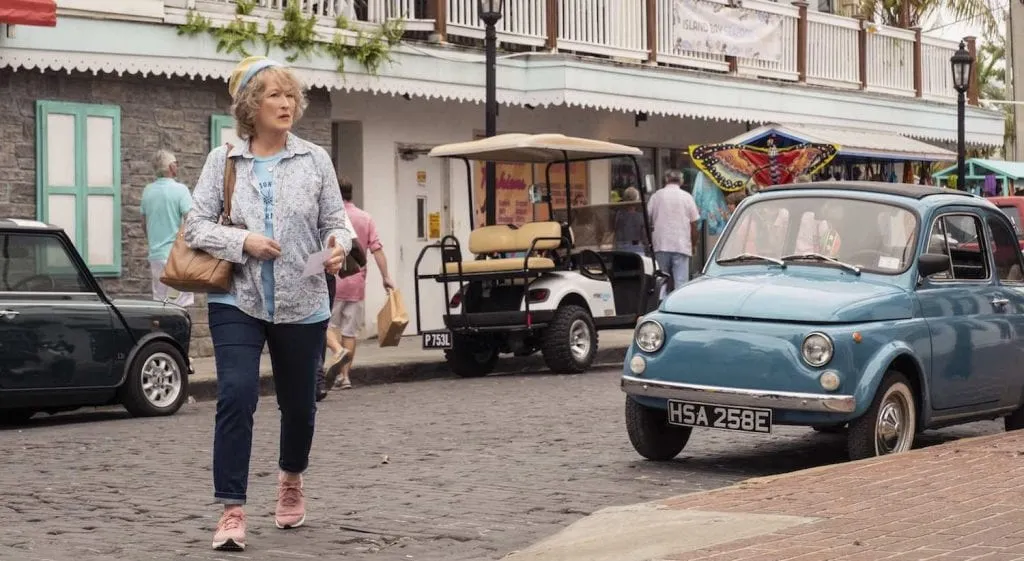¿Tiene alguien derecho a esconder una pierna de cerdo en una casa donde el resto de la familia pasa hambre (por más que el jamón sea suyo y solo suyo)? La respuesta a este cuestionamiento, en apariencia sencillo, es más compleja de lo que parece, pues nos encara con temas como la propiedad, la libertad, la convivencia y la ética, entre otros. El reciente escándalo de los "Papeles de Pandora" nos coloca, nuevamente, en el centro de esa reflexión y la película La Lavandería (2019) resulta bastante útil para entender, en clave de humor, cómo funciona este mecanismo de “corrupción legal” que permite a los ricos esconder sus fortunas y evadir impuestos, no solo en tiempos de pandemia (con millones de personas empobreciéndose alrededor del mundo), sino desde hace décadas, según parece. Bienvenidos a este viaje por el mundo de la economía, desde la óptica del cine. ¡Saludos Hiveanos!
Does anyone have the right to hide a leg of pork in a house where the rest of the family goes hungry (even if the ham is his and only his)? The answer to this apparently simple question is more complex than it seems, as it brings us face to face with issues such as property, freedom, living together and ethics, among others. The recent "Pandora's Papers" scandal places us, once again, at the center of this reflection and the film The Laundromat (2019) is quite useful to understand, in a humorous way, how this mechanism of "legal corruption" works, which allows the rich to hide their fortunes and evade taxes, not only in times of pandemic (with millions of people impoverished around the world), but for decades, as it seems. Welcome to this journey through the world of economics, from the point of view of cinema. Greetings Hiveans!
Primero ¿Qué son los Pandora Papers?
Según un reportaje reciente de la BBC, “Los Pandora Papers son una filtración de casi 12 millones de documentos que revelan riqueza oculta, elusión fiscal y, en algunos casos, lavado de dinero por parte de algunas de las personas ricas y poderosas del mundo”. Se trata de la mayor filtración de información financiera del planeta y el Consorcio Internacional de Periodistas de Investigación (ICIJ, por sus siglas en inglés), respalda los datos, por tratarse de una investigación que involucra a 600 periodistas de 150 medios de comunicación en 117 países, quienes durante meses revisaron 11.903.676 archivos (2,94 TB de datos) con información de documentos confidenciales de 14 entidades especializadas en la creación de sociedades en paraísos fiscales, como Panamá o las Islas Vírgenes Británicas.
Los Papeles de Pandora revelan “una industria enfocada a ayudar a los más ricos a ocultar su riqueza en territorios que ofrecen anonimato y baja o nula tributación. Los documentos retratan también a los clientes de esta industria y a los intermediarios que les sirven de puente para acceder a estos servicios”, nos cuentan Montse Hidalgo y Pérezdaniele Grasso, en un reportaje para El País, de España.
Pero ¿Cuál es el problema con que los ricos pongan y hagan con su dinero donde y lo que quieran? En principio, ninguno. De hecho, las compañías off shore son completamente legales. Pero “eso no quita que sean cuestionables", explica Dan Hough, jefe del Departamento de Política en la Universidad de Sussex, en Inglaterra, y autor de Analyzing corruption. "De hecho, son completamente legales. Y es precisamente por eso que son tan cuestionables", recalca el especialista. Para Hough, el entramado de compañías offshore es la forma más evidente hoy en día de "corrupción legal", según otra nota de la BBC.
First, what are the Pandora Papers?
According to a recent BBC report, "The Pandora Papers are a leak of nearly 12 million documents revealing hidden wealth, tax avoidance and, in some cases, money laundering by some of the world's rich and powerful people." It is the largest leak of financial information on the planet and the International Consortium of Investigative Journalists (ICIJ) supports the data, as it is an investigation involving 600 journalists from 150 media outlets in 117 countries, who for months reviewed 11,903,676 files (2.94 TB of data) with information from confidential documents of 14 entities specialized in the creation of companies in tax havens, such as Panama or the British Virgin Islands.
The Pandora Papers reveal "an industry focused on helping the wealthiest hide their wealth in territories that offer anonymity and low or no taxation. The documents also portray the clients of this industry and the intermediaries that serve as a bridge to access these services," Montse Hidalgo and Pérezdaniele Grasso tell us in a report for El País, Spain.
But what is the problem with the rich putting and doing with their money wherever and whatever they want? In principle, none. In fact, offshore companies are completely legal. But "that doesn't take away from the fact that they are questionable," explains Dan Hough, head of the Department of Politics at the University of Sussex, in England, and author of Analyzing corruption. "In fact, they are completely legal. And that is precisely why they are so questionable," emphasizes the specialist. For Hough, the web of offshore companies is the most obvious form of "legal corruption" today, according to another BBC article.
Un problema adicional con estas revelaciones es el contexto en el que se dan: Economías deprimidas, con cifras de pobreza en ascenso, producto de la pandemia. “El desvío de beneficios por parte de empresas y la ocultación de grandes fortunas generan agujeros millonarios en los ingresos públicos de los Estados y agrietan el Estado de bienestar”. Como dice Susana Ruiz, responsable de justicia fiscal de Oxfam, el resultado “son hospitales y escuelas que no existen”, nos cuenta el mencionado reportaje de El País.
Desde artistas y futbolistas, como Miguel Bosé y Pep Guardiola, hasta jefes y exjefes de Estado, entre los que figuran catorce latinoamericanos (tres de ellos actualmente en funciones), figuran en la lista de clientes de estos proveedores de “lugares secretos” para esconder sus fortunas y regularizar capitales de origen sospechosamente non santos. Jefes de Gobierno, como Putin y Andrej Babis, reyes, como Juan Carlos I (de España) y Abdala III (de Jordania), incluso instituciones, como el Partido Conservador inglés o la congregación Legión de Cristo, se ven señalados por estas revelaciones que involucran a amantes, pago de favores, compras fraudulentas o redes de lavado y legitimación de capitales.
An additional problem with these revelations is the context in which they occur: Depressed economies, with poverty numbers on the rise, a product of the pandemic. "The diversion of profits by companies and the concealment of large fortunes generate millionaire holes in the public income of the States and crack the Welfare State". As Susana Ruiz, head of tax justice at Oxfam, says, the result "is hospitals and schools that don't exist", according to the aforementioned report in El País.
From artists and soccer players, such as Miguel Bosé and Pep Guardiola, to heads and former heads of State, including fourteen Latin Americans (three of them currently in office), are on the list of clients of these providers of "secret places" to hide their fortunes and regularize capital of suspiciously unholy origin. Heads of Government, such as Putin and Andrej Babis, kings, such as Juan Carlos I (of Spain) and Abdullah III (of Jordan), and even institutions, such as the British Conservative Party or the Legion of Christ congregation, have been singled out by these revelations involving mistresses, payment of favors, fraudulent purchases or money laundering networks.
No es la primera vez que se filtra este tipo de información. En 2016, los Papeles de Panamá (una filtración de 11,5 millones de documentos) revelaron lo natural que era para los ricos evadir impuestos y esquivar sus compromisos con los países, sociedades y personas fuentes de su riqueza, escudándose en paraísos fiscales y el secreto bancario. Precisamente, basada este caso, se estrenó en 2019, con proyección limitada en cines y posterior distribución en Netflix, La Lavandeía, dirigida por Steven Soderbergh y protagonizada por Meryl Streep, Gary Oldman y Antonio Banderas, encabezando un reparto de lujo.
This is not the first time this type of information has been leaked. In 2016, the Panama Papers (a leak of 11.5 million documents) revealed how natural it was for the rich to evade taxes and dodge their commitments to the countries, companies and people who were the sources of their wealth, hiding behind tax havens and banking secrecy. Precisely, based on this case, was released in 2019, with limited screening in theaters and subsequent distribution on Netflix, The Laundromat, directed by Steven Soderbergh and starring Meryl Streep, Gary Oldman and Antonio Banderas, heading a deluxe cast.
La película
La Lavandería está basada en el libro del ganador del Premio Pulitzer, Jake Bernstein, Secrecy World: Inside the Panama Papers Investigation of Illicit Money Networks and the Global Elite. Cuenta, en tono bastante didáctico, como se crea una compañía foránea que sólo existe en los papeles, sin oficinas ni empleados. “Sólo es una dirección de correo y un apartado postal en algún país cuyas leyes favorezcan sus metas financieras. ¿En qué país? Islas Seychelles, Chipre o Panamá”, explican los asesores financieros Jürgen Mossack (Gary Oldaman) y Ramón Fonseca (Antonio Banderas).
Mossack y Fonseca son personajes muy reales, que terminaron en la cárcel al destaparse el escándalo de los Papeles de Panamá, aunque consiguieron salir en libertad a los pocos meses. La ficción en esta historia la pone Ellen (Meryl Streep), quien después de una tragedia durante sus vacaciones, descubre que ha sido víctima de un fraude de seguros e inicia una investigación por su cuenta que la pone en curso de colisión con los intereses de nuestros narradores. Las voces de Mossack y Fonseca son el hilo conductor de la trama, quienes con mucho humor hablan a la cámara y conectan varias historias, en un cínico (¿o sincero?) esfuerzo de contar su versión de los hechos.
The Movie
The Laundromat is based on Pulitzer Prize winner Jake Bernstein's book, Secrecy World: Inside the Panama Papers Investigation of Illicit Money Networks and the Global Elite. It tells, in a rather didactic tone, how an offshore company is created that exists only on paper, with no offices or employees. "It's just a mailing address and a post office box in some country whose laws favor your financial goals. Which country? Seychelles, Cyprus or Panama," explain financial advisors Jürgen Mossack (Gary Oldaman) and Ramón Fonseca (Antonio Banderas).
Mossack and Fonseca are very real characters, who ended up in jail when the Panama Papers scandal was uncovered, although they were released a few months later. The fiction in this story is provided by Ellen (Meryl Streep), who after a tragedy while on vacation, discovers she has been the victim of insurance fraud and begins an investigation on her own that puts her in a collision course with the interests of our narrators. The voices of Mossack and Fonseca are the common thread of the plot, who humorously speak to the camera and connect various stories, in a cynical (or sincere?) effort to tell their side of the tale.
La película tiene secuencias que nos recuerdan a La Gran Estafa y a ese Soderbergh que tanto nos gusta ver. La grafía, el color y los buenos diálogos se combinan para revelar con ligereza las verdades de un mundo turbio y muy pesado, que termina afectándonos más de lo que en principio podríamos creer. Otro punto destacable es el elenco. Incluso en papeles apenas figurantes podemos encontrarnos con una Sharon Stone o un David Schwimmer, quienes, junto a Jeffrey Wright, Robert Patrick, Will Forte, Jay Paulson y Larry Clarke, nos proveen una historia sólida, divertida, lo mismo que verosímil y muy seria, si se consideran las implicaciones sociales, económicas y políticas (por no hablar de las éticas y morales) que tienen este tipo de escándalos, cada vez más frecuentes y aparentemente menos escandalosos.
Como dato curioso, vale la pena añadir que, los verdaderos Jürgen Mossack y Ramón Fonseca, demandaron a Netflix, el 16 de octubre de 2019, intentando bloquear el lanzamiento de la película, sosteniendo que los difamaba. Netflix calificó la demanda de "risible" y argumentó que la película era "discurso constitucionalmente protegido". Un juez de Connecticut trasladó el caso a California y detuvo una orden judicial, permitiendo que el film se lanzara según lo planeado.
Por todo esto y mucho más, creo que La Lavandería es una peli que vale la pena ver, en la que información y entretenimiento se mezclan, con el fino bitter del buen humor, y que cobra mucha vigencia en estos días, con la reciente revelación de nuevos “Papers”.
The film has sequences that remind us of Ocean´s Eleven and that Soderbergh we love to watch so much. The graphics, the color and the good dialogues combine to reveal with lightness the truths of a murky and very heavy world, which ends up affecting us more than we might at first believe. Another highlight is the cast. Even in roles that are barely figurants we can find a Sharon Stone or a David Schwimmer, who, together with Jeffrey Wright, Robert Patrick, Will Forte, Jay Paulson and Larry Clarke, provide us with a solid, funny, as well as plausible and very serious story, considering the social, economic and political implications (not to mention the ethical and moral ones) that this type of scandals have, more and more frequent and apparently less scandalous.
As a curious fact, it is worth adding that, the real Jürgen Mossack and Ramón Fonseca, sued Netflix, on October 16, 2019, trying to block the release of the movie, arguing that it defamed them. Netflix called the lawsuit "laughable" and argued that the film was "constitutionally protected speech." A Connecticut judge moved the case to California and stopped an injunction, allowing the film to be released as planned.
For all this and much more, I think The Laundromat is a movie worth seeing, in which information and entertainment are mixed, with the fine bit of good humor, and which is very relevant these days, with the recent revelation of new "Papers".
Otro punto interesante del filme es el discurso final, extraído textualmente del “Manifiesto de John Doe” (el informante anónimo que filtró los documentos de los Papeles de Panamá en 2014). Algunos críticos lo han señalado como “sermonero”o “pancartista”, afirmando, incluso, que tira por tierra el ingenio y las ambiciones creativas de Soderbergh y Scott Burns (el guionista). En una parte dice: “En el sistema —nuestro sistema— los esclavos no están conscientes de su estado y de sus dueños, quienes existen en un mundo aparte donde los grilletes intangibles se ocultan cuidadosamente entre montones de inalcanzables jergas jurídicas… Demuestra que los cheques y saldos de la democracia han fallado, que la crisis es sistemática y que la inestabilidad severa podría estar a la vuelta de la esquina”.
¿Tú, qué opinas?
Another interesting point of the film is the final speech, taken verbatim from the "John Doe's Manifesto" (the anonymous whistleblower who leaked the Panama Papers documents in 2014). Some critics have pointed to it as "preachy" or "pamphleteering", even claiming that it undermines the ingenuity and creative ambitions of Soderbergh and Scott Burns (the screenwriter). In one part it says: "In the system - our system - the slaves are unaware of their status and their masters, who exist in a world apart where intangible shackles are carefully hidden among piles of unattainable legal jargon... It shows that the checks and balances of democracy have failed, that the crisis is systemic and that severe instability could be just around the corner."
What do you think?
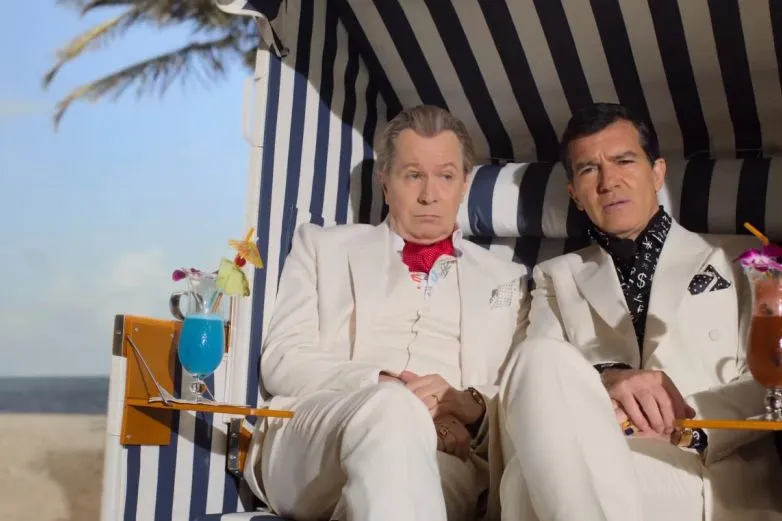 Fuente
FuenteHasta aquí nuestra reseña de hoy. Espero les haya resultado grata, informativa o al menos medianamente entretenida. Si ya viste La Lavandería o te animas a hacerlo después dela lectura, me gustaría conocer tu opinión en los comentarios.
Dejo por acá enlaces a mis post anteriores, en caso de que gustes seguirnos leyendo. ¡Hasta la próxima, Hiveanos!
So much for our review today. I hope you found it enjoyable, informative or at least mildly entertaining. If you've already seen The Laundromat or are encouraged to do so after reading it, I'd love to hear your opinion in the comments.
I'm leaving links to my previous posts here, in case you'd like to keep reading. Until next time, Hiveans!
Mare of Easttown and another Emmy for Kate Winslet / Mare of Easttown y otro Emmy para Kate Winslet
51 years without Janis (today's date) / 51 años sin Janis (tal día como hoy)
Reading the heroes (poem) / Leyendo a los héroes (poema)



